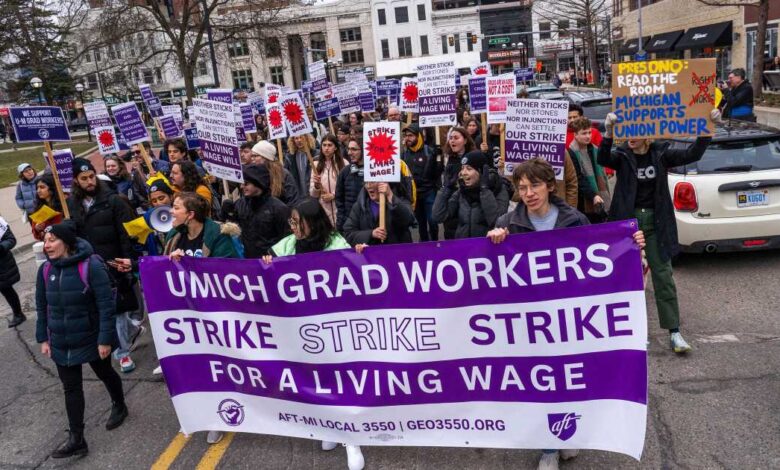‘Enormous Surge’ in Unions Reflects Disconnect Between Colleges and Graduate Employees

[ad_1]
Andrew Eneim has a front-row seat to what he describes as the “leaky pipeline” of graduate school.
Low stipends, high workloads, and “rampant” poor treatment force some students, particularly those without independent wealth, to drop out and give up their tenure-track dreams to pursue more-secure careers, said Eneim, a Ph.D. candidate in biophysics at the Johns Hopkins University. Such working conditions, he said, exacerbate higher ed’s struggle to diversify the faculty.
“We’re basically just not being paid enough to live,” Eneim said in an interview.
Those concerns prompted Eneim and other Johns Hopkins graduate students to vote in favor of a union this spring. Johns Hopkins officials said in a message to the campus that they looked forward to working with the new union.
Johns Hopkins isn’t alone. Energized by the biggest strike in the history of higher education at the University of California last fall, as well as a renewed national enthusiasm for organized labor, graduate students across the country spent the spring semester drumming up support for unionization and pushing their colleges to raise pay and benefits.
Five months into the year, graduate employees at at least nine colleges have voted to establish unions, already more than the seven formed in all of 2022.
That’s according to William A. Herbert, executive director of the National Center for the Study of Collective Bargaining in Higher Education and the Professions, at Hunter College of the City University of New York, which tracks unionization efforts. He said the 2022 and 2023 election data “demonstrate an even stronger preference for union representation” than elections that took place in the decade before the pandemic.
Students see it as an enterprise where they are making what feels like not that much money for what feels like a lot of work.
That brings the total number of colleges with graduate-employee unions up to about 60, according to Joseph van der Naald, a graduate student in sociology at the CUNY Graduate Center and an assistant to Herbert at the national collective-bargaining center. As of 2019, there were only 37, according to a 2020 report from the center.
Three graduate unions have gone on strike in 2023 so far, on track to outpace the four that went on strike in all of 2022, Herbert wrote in an email.
In addition to demanding higher pay, graduate students are advocating for sexual-harassment protections, improved health benefits, increased benefits for international students, and other measures aimed at supporting students from marginalized backgrounds.
Colleges have traditionally argued that graduate students are primarily students who earn small stipends to work part time as instructors and researchers. The surge in union organizing is putting pressure on colleges to restructure that relationship — a shift that could have major financial and philosophical consequences for higher ed.
Research and Reputation
Behind graduate students’ union momentum is a growing recognition of the long hours required in both teaching and research roles, union organizers say.
Graduate students are also embracing the argument that their academic research contributes to the reputation of their institutions — and they are leveraging that at the bargaining table. (The research question is a debated one; federal law and colleges consider dissertation research to be a part of grad students’ education, not of their employment.)
Another factor driving more unionization, Herbert said, is the relative stability of labor law on the employee status of graduate assistants at private colleges. For years, their status fluctuated depending on the shifting politics of U.S. presidents and their appointments to the National Labor Relations Board. Since a 2016 ruling in favor of Columbia University’s graduate-student assistants, such graduate-level teaching and research assistants have been considered employees. (Public-college grad students are governed by state labor law.)
Duke University is contesting its graduate students’ attempt to organize and is awaiting a ruling from the regional NLRB. The challenge could ultimately overturn the 2016 precedent, but President Biden’s national board has typically taken pro-labor positions.
Most of the recent growth in unionization has come at private colleges, said Van der Naald, whose research focuses on labor. He said that higher education is organizing at a higher rate than other industries, in large part due to the “enormous surge” from graduate students. Inspiration from concurrent social movements and political groups, like Black Lives Matter and the Democratic Socialists of America, is contributing to the increase, Van der Naald said.
“This semester in particular, 2023, I think it’s shaping up to be the biggest year of graduate-student employee-unionization growth yet,” Van der Naald said.
While the social and political developments set the stage for the upswing, the biggest factor, observers seem to agree, is economic. “This confluence of depressed wages, the impact of inflation, rents, and housing, the cost of living in general, and then the student-loan debt, was really the big thing driving it right now,” said Julie Schmid, executive director of the American Association of University Professors, in an interview.
When stipends don’t cover basic needs like housing and food, graduate students say that prevents them from doing their best work.
Both administrators and graduate students generally agree that it’s best if graduate students don’t work second or third jobs on top of their studies, Herbert said. Some colleges require them to get approval before accepting side jobs.
The Cost of Living
In strikes at major universities across the country, graduate unions have demanded significant increases in their compensation — arguing that graduate students deserve wages that cover the local cost of living.
“There is a desperate need for better respected graduate-student positions that are paid equivalent to what we need to be paid to exist in the places that we are expected to teach in,” said Becky Martin, an electrical and computer engineering Ph.D. student at the University of California at Santa Barbara and co-president of the UC-Santa Barbara Graduate Student Association. Martin was closely involved with the University of California strike last fall, where grad students often cited the cost of living in expensive California cities.
After UC graduate students won a roughly 50-percent increase in their minimum stipends last semester, graduate students at Temple University went on strike this spring for over a month, demanding a 50-percent increase. Temple strikers eventually settled for a 30-percent increase by 2026.
At the University of Michigan at Ann Arbor, graduate students have been on strike for over a month, and some are withholding end-of-semester grades. Michigan graduate instructors are demanding a 60-percent increase in their minimum stipend, from roughly $24,000 to over $38,000.
“Four out of five of our members are considered rent burdened,” said Amir Fleischmann, a graduate student in political science and a union leader.
In an emailed statement, Kim Broekhuizen, a spokesperson for the university, said members of the union are part-time employees who are “assigned a probable weekly time commitment of 16.5-20 hours per week.” Though fluctuations above and below those hours are “expected,” Broekhuizen said, most graduate students work within those hours most of the time. That means stipends average out to about $35 per hour, Broekhuizen said.
Fleischmann said the part-time commitment in their current contract is “detached” from reality and that graduate instructors regularly work full-time hours.
Contract negotiations at Michigan affect only graduate-student instructors and staff assistants, not research assistants. But the disconnect between colleges and graduate employees about time commitments for assistantships extends to part-time research appointments as well.
“The whole 20-hours-a-week thing is basically just an accounting trick,” said Holden Thorp, editor in chief of the Science family of journals. Thorp is also a former provost of Washington University in St. Louis and former chancellor of the University of North Carolina at Chapel Hill. “In fact, most graduate students would probably be kicked out of graduate school if they only worked 20 hours a week.”
The pay raises students are demanding may feel justified to them, but administrators typically “don’t want to give as much as unions want,” said Joseph P. McConnell, a partner at the law firm Morgan, Brown & Joy, which has represented colleges, including Harvard University and the Massachusetts Institute of Technology, in collective-bargaining disputes. Stipend increases affect college’s budgets significantly, he said.
At the University of California, campuses within the system have not received guidance on how to balance their budgets while paying their graduate students 50 percent more. As a result, some campuses are considering admitting fewer students, Berkeleyside reported.
UC-Berkeley has allocated $18 million toward raises, but that doesn’t even cover half of the $38-million bill, according to Berkeleyside — leaving individual departments to find the money or reduce the number of students. A Berkeley spokesperson told the publication that the approach was temporary while the university irons out long-term funding solutions.
What Counts as Work?
Many graduate students also have philosophical disagreements with college officials about where their employment ends and their education begins, which contributes to the rift over how they should be compensated.
At Michigan, Fleischmann argued that graduate students contribute over a billion dollars of research output. “Without having top-quality graduate students doing that research, it simply wouldn’t be the case that the University of Michigan could deliver on its mission as a research university,” Fleischmann said.
They don’t approach their Ph.D. candidates as commodities that enhance the institution, but rather as colleagues who they’re bringing in.
But Broekhuizen, the Michigan spokesperson, said, “The contract being negotiated only pertains to graduate-student workers’ roles as instructors or staff assistants and has no bearing on the work that they do as a part of an academic program at the university.” Still, Broekhuizen said, administrators “appreciate and honor the academic and research achievements” of graduate students.
Disagreements over the line between dissertation work and employee responsibilities occur “at every table,” McConnell said.
Graduate students think their research is commodified and deserves remuneration, McConnell said. “The students see it as an enterprise where they are making what feels like not that much money for what feels like a lot of work,” he said.
For administrators, however, maintaining and emphasizing the student status of graduate students is important, McConnell said. They believe that “reducing” the relationship to employment “loses something in the translation,” he said. Most administrators tell him they care most about ensuring robust academic training for their graduate students.
“They don’t approach their Ph.D. candidates as commodities that enhance the institution, but rather as colleagues who they’re bringing in, on student status, into the world of their subject matter,” McConnell said. “That’s why they work hard at the table to separate the two things, because they want to keep the students’ education-forward perspective from being devolved into dollars and cents only.”
As Thorp sees it, there is “no principled argument that says that the graduate students are not full-time employees and that they’re not making a major contribution to the research effort of the university.”
Conflicts over graduate-student working conditions, Thorp said, often stem from the fact that colleges try “to use the resources they have to do as many things as possible.”
As higher ed has been forced to do more with less over the years, institutions have increasingly relied on lower-wage labor from graduate workers and adjunct faculty to make the budget math work. Changing that balance would be “a hard battleship to turn,” he said.
“It’s easy for the union to say, look, University X, you’ve got all these billions in your endowment. Why can’t you use that to increase the salaries of the graduate students?” Thorp said. “The answer is, they could, but they’d have to stop doing something else. And they’re not very good at doing that.”
[ad_2]
Source link






